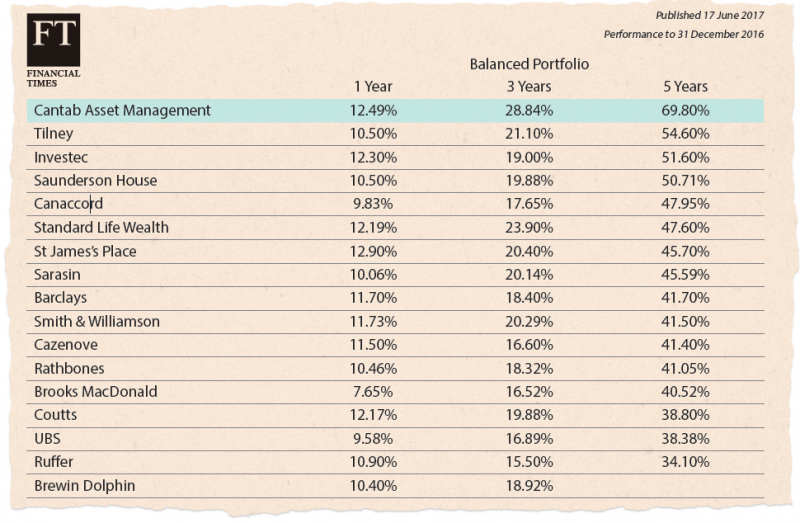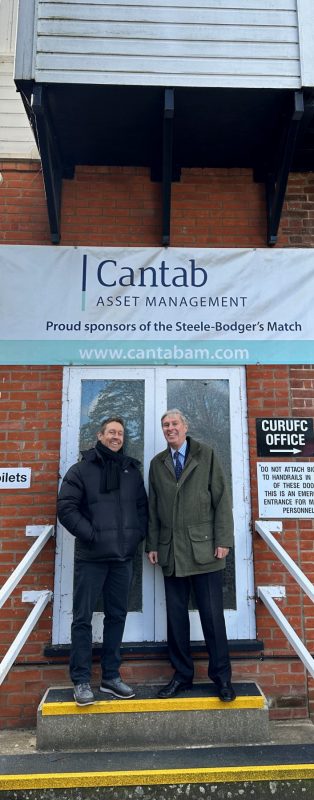

The Financial Times publishes a guide to wealth management firms providing private client services. We were delighted to be singled out in the 2017 FT Private Client Wealth Management Guide for having the best performing average balanced portfolio over five years. This is the second year running for Cantab to take the top spot.
Asset Allocation
The report considers the current asset allocation of a typical portfolio, giving us an opportunity to reflect on Cantab Asset Management’s investment approach. This reveals that the typical portfolio contains allocations to both hedge funds and private equity. This contrasts with Cantab Asset Management’s approach, which does not currently include these areas. The reasons for this are discussed in detail in our research notes; in summary, they are the lack of transparency and illiquidity of these funds, combined with the historical tendency of hedge funds to fail to act as a hedge. Cantab Asset Management’s preference for conventional assets (such as equities, bonds and commercial property) has proven to be valuable for clients.
Cantab operates a series of risk-rated portfolios, which act as best ideas, but Cantab considers each client on an individual basis. Individual requirements may affect the most appropriate investment mix and fund selection. These may include considerations such as: expenditure needs; specific goals to distribute funds; whether a total return or ‘natural’ income policy is used; existing holdings; and the client’s wider asset position.
Cantab’s ‘Moderate portfolio’ takes a diversified approach to asset allocation, investing in Open Ended Investment Companies, ‘OEICs’, across the major asset classes. As at 1 February 2018, the Moderate portfolio has a 60% exposure to equities, 25% to fixed income, 5% to property and 10% to alternatives.

Added Value
Returns are important. However, Cantab believes that clients benefit from long term relationships with the firm. Clients can have confidence in the longevity of the firm and the commitment of its advisers. Cantab’s roots go back over 30 years. Cantab is pleased to be independent under FCA rules, looking at all available options and free from conflicts of interest.
Increasingly, wealth management goes beyond investment management. Cantab Asset Management supports this philosophy and provides all clients with financial planning as well as the management of investments. Tax planning, retirement planning and intergenerational planning are all included. The FT’s report reveals that this continues to set Cantab apart from many of the traditional investment managers. By avoiding the additional ‘frills’ which are sometimes included (such as concierge service) Cantab has kept fees down, below the typical wealth management fee, whilst achieving outstanding results for clients.
The report also indicated that investment strategy, risk assessment and asset allocation are of great importance to clients.
Conclusion
In conclusion, the report provides an interesting discussion of some of the current issues in wealth management. As well as identifying Cantab Asset Management as providing top investment returns, the report points in the direction of some of the sources of those returns: asset allocation and investment strategy. It also points towards the wider financial planning services as adding value for clients. These in-built advantages should continue to support the successful delivery of outstanding client service.
Please contact our team to discuss in more detail.
Risk Warnings. This document has been prepared based on our understanding of current UK law and HM Revenue and Customs practice as at 1 February 2018, both of which may be the subject of change in the future. The opinions expressed herein are those of Cantab Asset Management Ltd and should not be construed as investment advice. Cantab Asset Management Ltd is authorised and regulated by the Financial Conduct Authority. As with all equity-based and bond-based investments, the value and the income therefrom can fall as well as rise and you may not get back all the money that you invested. The value of overseas securities will be influenced by the exchange rate used to convert these to sterling. Investments in stocks and shares should therefore be viewed as a medium to long-term investment. Past performance is not a guide to the future.


